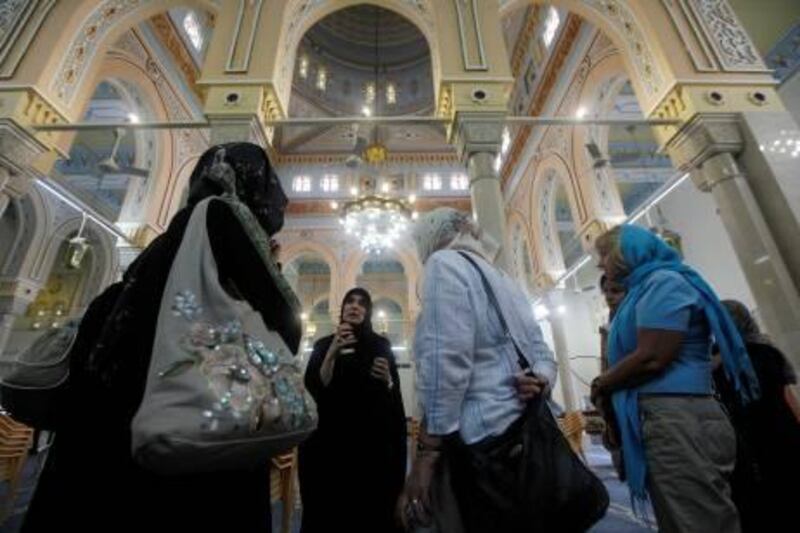ABU DHABI // Some 36 per cent of Emiratis would not object to having a non-Muslim neighbour, the survey found.
Family: Key findings from Progress and Tradition in the Gulf Cooperation Council States
Last Updated: May 25, 2011
• Family is an essential component in the GCC.
• Employed women in Bahrain and Saudi Arabia are more likely to work in a professional job than employed men, with women in Saudi Arabia (28%) three times as likely as their male counterparts (9%) to have professional careers.
• Four is the ideal number of children for GCC nationals vs. 2.4 in high-income countries.
• Highly educated Saudi women are the most likely in the GCC to say they have three or more children in their households..
• Qatar (59%) and United Arab Emirates (52%) lead GCC countries in charitable donations and are more likely to donate than the median for high-income countries (47%).
[ More on the Progress and Tradition in the GCC States report ]
In a section devoted to values and identity, researchers said religious diversity might be a challenge for GCC countries.
"We have a very diverse cultural environment in the Gulf," said Dalia Mogahed, the director and senior analyst at the Abu Dhabi Gallup Center.
"Nationals in the Gulf maintain their identity and their faith, but their comfort with the faith diversity around them is not as strong."
Some 4,000 Emiratis were surveyed. The UAE tested above Saudi Arabia, Kuwait and Qatar for religious tolerance.
But interfaith acceptance was lower than countries such as Egypt and Lebanon, where 79 and 88 per cent of citizens respectively said they respected different faiths.
"We cannot compare the Gulf society with Egypt or Lebanon," said Dr Aqil Kazim, a professor of sociology at UAE University.
"We do not have the same composition of population. In Egypt and Lebanon, they have lived among different religious groups for a long time."
Dr Kazim said Emiratis were in a unique position because of the huge influx of expatriate workers.
"In the Gulf, we have a multicultural environment with more than 200 nationalities, different ethnicity groups, races and traditions," he said.
Yousef al Ghufli, 21, an Emirati, said he had always lived in multinational neighbourhoods.
"My friends always came from a mixture of nationalities and I greatly enjoyed it," he said.
Living in interfaith neighbourhoods was not an unusual concept in the Middle East, according to Nasif Kayed, the general manager of Sheikh Mohammed Centre of Cultural Understanding.
"We have always lived side by side; that's what the Middle East is famous and known for," said Mr Kayed. "Take Al Andalus, for example, where people from all religions were part of each other's lives and getting along. From Muslims to Jews and Christians, all worshipped in the same place."
Religion: Key findings from Progress and Tradition in the Gulf Cooperation Council States
Last Updated: May 25, 2011
• GCC nationals consider faith central to their lives, a view that the young and old share across the GCC.
• Women in Saudi Arabia, Bahrain, and Kuwait are slightly more likely than men to say faith is involved in all aspects of life.
• 96% of nationals in Qatar feel respected when practicing their religion in public.
• Less than half of GCC nationals say they would not object to having a person of another faith move next door. This is in contrast to other countries in the region, such as Egypt and Lebanon, where majorities would welcome interfaith neighbors.
[ More on the Progress and Tradition in the GCC States report ]
Ali Alsaloom, a cultural consultant who writes for The National, said support for living among those of your own faith was not surprising. "People prefer to live among their own because it's one of the ways to keep your identity and not have it diluted," Mr Alsaloom said.
Haleema al Ajami, 24, said she did not mind living next to expatriates. "But I really miss the home feeling I used to have when my Emirati friends lived next to us," she said. "Now we are living next to people from different backgrounds and religions for years, but we still feel embarrassed to visit them and get to know them, as we don't know if they will welcome us or they would think that we are interfering with their lives."
Anna Roberts, 23, from New Zealand, has lived in the UAE for 17 years and speaks some Arabic. She shared Ms al Ajami's views.
"I feel there is a distance between me and them in my new neighbourhood," Ms Roberts said, adding she used to play with Emiratis in her old neighbourhood when younger.
"I would like to greet the men in the morning when they go to mosque but I hold myself back because I don't want to be out of line. They might be offended."
Abdulrahman Salem, 18, said he would not mind living next to non-Muslims but there were occasions when foreigners in his neighbourhood did not show enough respect.
"Many foreigners - be it males or females - jog around the neighbourhood in clothing that is more suitable for the beach," Mr Salem said.
He was also upset by complaints about the call to prayer. "[They complained] that the athan is distracting their extra hours of sleep before work, while we have to put up with their late-night partying," Mr Salem said.
But Mr Kayed said Islam revolved around peaceful behaviour and teaching through example, as the Prophet Mohammed showed.
"You don't have to preach or force," he said. "To judge them just because the guys are wearing shorts and the girls are wearing miniskirts is totally uncivilised and, honestly, it's un-Islamic and un-Arabic."
[ Read the Progress and Tradition in the GCC States report here ]






